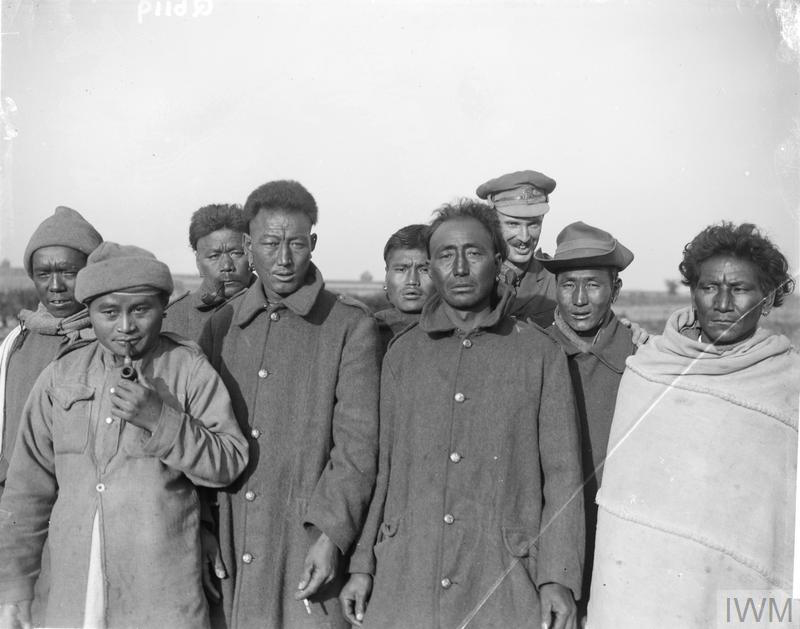I am reblogging this post from Historic England’s Heritage Calling blog. A matter of necessity I believe. The service of thousands of non-white personnel, who provided essential labour and more during World War 1, more often than not went unregarded and unrewarded. In East Africa alone 50,000 conscripted African porters of the Carrier Corps lost their lives. Many families who had waved goodbye to their sons never heard of them again, or received their pay, or compensation, or even a thank you from the British Army. That is one story. Here are many others – of the Chinese Labour Corps in particular:
The Labour Corps of the First World War comprised mostly of a now largely forgotten multi-ethnic army of tens of thousands of workers (along with British servicemen unfit to fight), without whose manpower the war would have ground to a halt.
These unarmed non-combatants, working under military control, carried out crucial tasks behind the lines on the Western Front and in other theatres of war – building and repairing docks, roads, railways and airfields, manning ports, stores and ammunition depots, unloading ships and trains, digging trenches and constructing camps.
 SANLC men round a brazier at their camp, Dannes, France, March 1917. © IWM Q4880.
SANLC men round a brazier at their camp, Dannes, France, March 1917. © IWM Q4880.
After the Armistice, the Corps undertook the dangerous and difficult work on former battlefields clearing live ordnance and exhuming bodies – reburying them in the great military cemeteries of the Commonwealth War Graves Commission (CWGC).
Despite their vital contribution (including the Chinese, Indians and South Africans, many of whom…
View original post 1,215 more words


There is so much we will never know about that shaped our todays.
That is all too true. And many of these stories have been been deliberately buried.
Man’s inhumanity to man…truly disgraceful
It makes me fume, and especially in the face of current xenophobic tendencies.
Exactly
Deliberately buried along with the people who did the work.
Many Africans died in a war they had nothing to do with and what’s worse, they were not even recognised for their contributions
Yes, and in both World Wars, and Africans from all over the Continent. In WW2 where more Africans joined up as combatants, they suffered the indignity of segregation and less pay. It was also assumed that because they lived near the equator they would be the best fitted to fight the Japanese in Burma’s hellish tropical forest conditions. The role of African (especially Kenyan) troops in the final defeat of the Japanese is scarcely acknowledged. Kenyans came home victorious, only to be disarmed and sent back to the native reserves (I know you know all this.) Indian troops were also under-regarded. As a bit of personal family history, at the end of WW2 Graham’s father was posted as an artillery instructor to Kenya, based on the Athi Plains, and was then training young Luo lads, among others, for the invasion of Japan. Fortunately that did not happen.
That kind of detail is quite disgusting. Of course.
OMG, so touching!
Thank you Tish. I’ve caught glimpses of the labour corps men as I’ve read WW1 history, but certainly never anything that foregrounded them as an essential part of the war effort and absolutely never as individuals. We had a number of Aboriginal soldiers who served and came back to appalling treatment. Expendable and unvalued because of their race. Even the Poles, for different reasons, were sidelined after the war – not allowed to march in the victory marches, despite their astonishing airforce contribution, because, if I remember correctly “it might offend Stalin.” Always exploitation and expediency.
Something I always struggle to grapple with – expediency. And with hindsight, it always seems to erupt in a Pandora’s Box of bad consequences.
A sobering article. The British empire remains a bit of a mystery to most Americans, who are no better for their treatment of minorities and people of color in the military and out.
You just keep wondering why it had/has to be like this, disparaging/disenfranchising other humans on the basis of their skin colour.
I know. I thought the US had moved past so much of that but the current political and cultural climate in this country has proven otherwise. It is disheartening.
This bit of the UK’s history should be in the school curriculum, it might help to change attitudes. In Exeter during WW2, the black GI’s stationed her weren’t allowed to cross the river into the city.
Oh that is so dreadful. OK to be ‘cannon fodder’. And I agree about the curriculum. There seems to be quite a lot missing from it!
posted on my fb, tw and G+
Excellent!
I knew most of this in a general way – but, boy, do we need to make sure we remember, remind people – and thank God (or whatever) that most of us have moved on in so many ways. Well done, Tish!
Thanks, Mike.
Another unpalatable part of history that has been buried away for too long. Good for you re-blogging this Tish, especially in our current fractured, xenophobic world.
Thanks, Su. The saddest part is this feels like the tip of the ice berg in terms of those overlooked.
I can’t help but feel you are right Tish.
Sadly Tish, the older I get the more I don’t understand the human race.
You and me both.